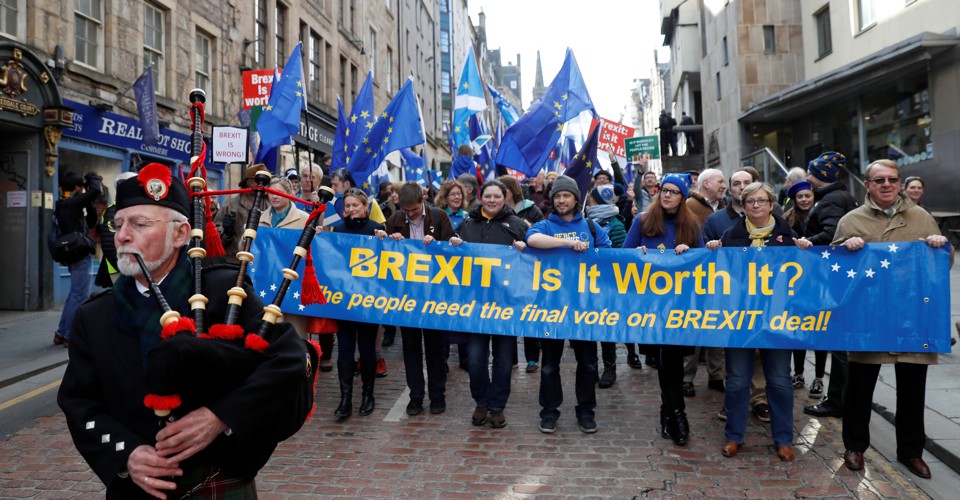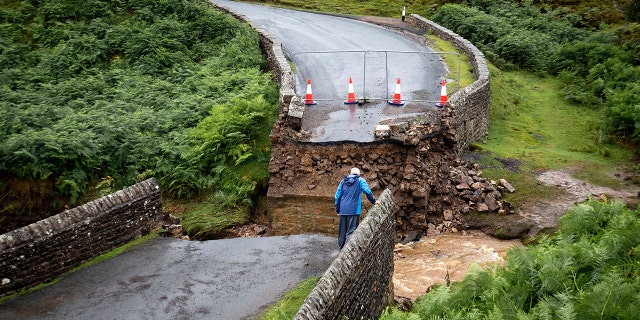
EDINBURGH—One afternoon in the early 1990s, the vice president of the European Parliament sat down to a congenial lunch at a Brussels restaurant with a young reporter for The Daily Telegraph.
The parliamentarian was David Martin, a Scot and a member of the Labour Party who held his seat for 35 years, a run that finally ended in elections this past May. A Europhile, Martin neither questioned Scotland’s place within the United Kingdom, a formation that had held for hundreds of years, nor the U.K.’s place within the European Union, a newer alliance but seemingly an iron-cast certainty. Across the table sat Boris Johnson, who was assigned to cover the European Union for The Daily Telegraph, acquiring on the way a reputation for concocting stories of overzealous Brussels administrators bringing in nonsensical regulations on matters such as the maximum size for condoms or the allowable curvature of a banana.
Martin remembers finding Johnson a mildly amusing character. “I used to laugh at the kinds of stories Boris wrote,” he told me. “I assumed people would simply see the bent bananas in the shops and they would believe what their eyes were telling them. But they didn’t.” Instead, Johnson’s ascendancy continued almost unabated, with him eventually winning election to Parliament and the London mayoralty, and, most recently, becoming prime minister. Along the way, he led the campaign to pull Britain out of the EU.
Martin could hardly have foreseen how profoundly his own vision—one of a Scotland that flourished both within the U.K. and the EU—would be undone by his lunch companion, and the politics he came to embody.
Today, many of the old certainties of Scottish politics no longer hold. It is a fraught, uncertain, and confusing period for politicians and voters alike, in which a landscape that once broadly divided along class lines has been reconfigured around two overlapping and profoundly polarizing constitutional questions: Scottish independence and Brexit.
Read: What's the worst that could happen if Scotland leaves the U.K.?
Martin, a widely respected figure and a pillar of Scotland’s involvement in the EU, is the latest casualty of this dilemma. He has long supported Scotland having a strong degree of autonomy from the British Parliament in London, but opposed outright independence. Now, with Britain due to leave the EU on October 31, remaining part of the U.K. and holding membership in the EU have begun to look more and more like mutually exclusive options for Scotland, rather than complementary ones.
The political calculus is shifting, and people like Martin are grappling with the fallout. “I have been in favour of the European Union and I have also been in favour of the U.K. union,” he told the Daily Record, a Scottish tabloid, in March. “But I am just wondering if that U.K. union is worth saving anymore.”
The politics of Brexit are inseparable from the politics of what in Britain is referred to as devolution, or legislating powers away from London and to assemblies in Northern Ireland, Scotland, and Wales. Scotland has its own legal, education, and health-care systems. In the three years since Britain voted to leave the EU, much of the focus has centered on Northern Ireland, a part of the U.K. and so destined to leave the bloc, and what will happen to its relationship with the Republic of Ireland, a separate state that will remain in the EU. There is no hard border between the two on the island of Ireland, and an arrangement between Brussels and London to safeguard peace by ensuring that the U.K. abides by EU customs arrangements until a permanent trade deal is made (meaning the border in Ireland could function as it does now) has been fiercely opposed by hard-line Brexit supporters who hold the balance of power at Westminster.
The effect of Brexit on Scotland’s continued membership of the U.K. may be less pressing—Scotland has no land border with an EU member state, and has not experienced sectarian conflict on anything like the scale Ireland has—but the lingering question of Scottish independence has been completely reframed by the prospect of a meaningful border with England.
Read: Brexit has brought the idea of Scottish independence back from the dead
Scottish support for the EU has not always been so strong. The Scottish Nationalist Party (SNP) opposed Britain’s membership in the bloc during a previous referendum in 1975 and the other major party here, Labour, did not take an official position, but from then on, Scots began to change their views. The Margaret Thatcher–led government in London carried out an intense period of privatization, leading to widespread closures and significant job losses in heavy industry. At roughly the same time, the EU began investing in Scotland, offering what the bloc calls “structural funds,” or money to poorer parts of the EU to help them catch up with richer areas, to areas where coal mines and steelworks had closed. The EU built infrastructure and industrial estates, and funded training programs. This was true not only in Scotland’s urbanized central belt, but in remote parts of the country such as the Highlands, too. Ewan Gibbs, a historian at the University of the West of Scotland, told me the EU provided “the means to navigate deindustrialization and transition to new forms of economic activity.” This was as much a question of identity as it was of economics: The term industrial citizenship is used by scholars to describe the common bond felt by the many Scottish workers employed directly by U.K. state-owned institutions such as the National Coal Board and British Steel in the mid-20th century. As the government sold off these assets, the ties that had long held industrial working-class communities in Scotland to the broader U.K. began to fray.
By the time of the 2016 referendum, every single council area in Scotland voted to remain in the EU. Overall, 62 percent of Scots favored continued EU membership.
Over the period from the 1970s onward, the twin factors of the EU’s greater role in Scotland and the devolution of powers to Edinburgh have helped bolster Scottish nationalism, which has gained in popularity. Martin sees this clearly. “Scottish nationalism is in part due to the strength of the EU,” he told me. “It weakens commitment to the U.K.”
Scotland voted by a margin of 55–45 to remain part of the U.K. in a 2014 independence referendum, a result that was supported by all of Britain’s political parties except the SNP and the Greens. But in allying with the Conservatives to oppose Scottish independence, Labour alienated a vast swath of its traditional supporters, and by the following year’s general election, it lost all but one of its 41 seats to the SNP. The Scottish nationalists have married a cautiously progressive policy platform and a technocratic style of government with a commitment to gaining independence. This has attracted support from a broad range of the political spectrum.
How these various factors interact—from the terms on which Britain leaves the EU (still in doubt) to levels of support for Scottish independence (higher than in years past, but by no means an overwhelming majority) and the future status of Scotland’s border with England—will be crucial for determining the shape of Scotland’s relationship with its U.K. and European neighbors in the years to come.
The long-running Brexit process has unraveled to the point where favoring a “no-deal” Brexit, one in which Britain leaves the EU without any agreement on the terms of its withdrawal, is no longer a fringe position. Johnson’s campaign for the Conservative party leadership was built on the promise of leaving without a deal on October 31 if no compromise is reached, and he has stacked his cabinet with hard-line euroskeptics.
All of this presents Scots with a litany of difficult choices. Trade and movement of people between Scotland and England, the most populous nation in the U.K., dwarfs that between Scotland and the rest of the EU. But leaving the EU would cause Scotland major difficulties, particularly in terms of trade. “As an exporting country,” Martin said, “any failure to have open access for goods like fresh seafood, food, and drink will seriously damage the Scottish economy. If there’s paperwork that gets it stuck for a couple of days, we’re in trouble.” The EU also provides Scotland with legal protections for Scotch whisky, a key export and a distinct brand in international markets.
Between the prospect of Brexit on the one hand and independence on the other, Scottish politics is mired in hypotheticals concerning what could happen were one or both of the major constitutional questions to be clearly resolved.
Read: A new British prime minister faces the same old Brexit problem
Proposals published by the Scottish government as early as 2016 outlined the possibility of a distinct form of Brexit for Scotland that could keep it within the European single market and the U.K. These proposals were largely ignored by Westminster, and Theresa May, Johnson’s predecessor as prime minister, kept consultation with devolved administrations to a bare minimum. The most resonant phrase in Scottish politics right now, repeated everywhere, is that Brexit will see Scotland dragged out of Europe against our will.
On the one hand, if the U.K. is able to leave the EU while retaining close alignment with the bloc on standards and regulations, this paradoxically makes it easier for Scotland to leave the U.K., because it could do so confident in the fact that it could join the EU and easily retain strong ties with the rest of Britain. But it would weaken the argument that Scotland needs to be independent in order to retain the benefits of EU membership. And if the U.K. were to leave without a deal, as Johnson has threatened, Edinburgh would then have to choose between maintaining close links with England (likely preserving the U.K.’s unity) and giving in to the political pressure the SNP would be under to push for full independence.
The Scottish government has sought to build a watertight case for independence, but has yet to push the button on another referendum for fear that a poorly timed poll could damage the nationalist cause for a generation. Brexit means that arguments for and against independence at any future vote will sound substantially different from those put forward in 2014, and the political battle lines may look different too.
The constitutional chaos is a far cry from any scenario Martin could have envisioned over lunch with Johnson a quarter century ago in Brussels—he had been the European Parliament’s rapporteur on treaties that had laid down the legal basis for the future of the EU. Now, he must grapple with what is, for him, as a unionist and a Europhile, an impossible paradox. “If we have a hard Brexit,” he told me, “independence becomes more desirable but less achievable … If we have a softer Brexit, it becomes less pressing to leave the U.K., but more achievable to do so.”
We want to hear what you think about this article. Submit a letter to the editor or write to letters@theatlantic.com.
https://www.theatlantic.com/international/archive/2019/08/scottish-independence-and-brexit/595234/
2019-08-01 06:00:00Z
CAIiENVdjjEx72v8yNJyrBFvR_UqFggEKg0IACoGCAowm_EEMKAiMMSWmwM






